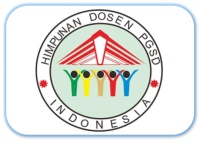Penerapan Model Problem Based Learning Meningkatkan Hasil Belajar Matematika Peserta Didik di Sekolah Dasar
Abstract
This fenelitian is set back by the lack of training for learners in identifying and solving a mathematical problem it is intended to describe and increase the product's itinerant and expansion-based problem model. The kind of research of classroom action (PTK) employs qualitative and quantitative approaches.The design of research involves planning, the performance of observation and reflection. The research subject was the teacher and student of the fourth grade the fields of 21 persons of 12 women and 9 boys. The data collection is through observation, testing and RPP assessment. Research shows: a) average RPP cycles I 76.78% increased in cycle II to be 96.42%.) b) implementation on the aspect of the teacher cycle I 76.78% increased on cycle II 92.85 %6): c) implementation on learning cycle I 75% increased on cycle II 92.85%): d) average value of studying cycle I 67.38% increased to 85.85% on sıklus II and thus the based problem model ıng could increase learners' learning on the circumference and wide build in the kartika IV class 1-12 padang.
Keywords
Problem Based Learning, Hasil Belajar
Full Text:
PDFReferences
Arikunto, S dkk. 2015. Penelitian Tindakan Kelas. Jakarta: PT Bumi Aksara
Fathurrohman, Muhammad. 2015. Model- Model Pembelajaran Inovatif. Jogjakarta: Ar- Ruzz Media
Herumen. 2016. Model Pembelajaran Matematika di Sekolah Dasar. Bandung: PT Remaja Rosdakarya
Purwanto, Ngalim. 2013. Prinsip-prinsip dan Teknik Evaluasi Pengajaran. Bandung: Remaja Rosdakarya
Riyanto, Yatim. 2009. Paragdima Baru Pembelajaran. Jakarta: Kencana Prenadamedia Group
Subyantoro. 2019. Penelitian Tindakan Kelas. Depok: Rajawali Pers
Susanto, Ahmad. 2013. Teori Pembelajaran di Sekolah Dasar. Jakarta: Kencana Prenada Media Group
DOI: http://dx.doi.org/10.24036/e-jipsd.v9i3.10109


